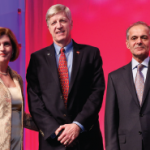- Think about patient selection. Look for patients who will be open and willing to share their story. Although Dr. Cannella has found patients love the LPEs once they do them, there can be some initial hesitation. “The last thing you want to do is make a patient feel uncomfortable,” she says. Still, she has yet to have a patient say no; some even take time off work to come and teach during the four-hour event. At this point, the repeat patients know each other, and many have formed friendships.
- Let patients know several months in advance. Repeat patients will ask when the LPEs will be held so they can get it on their calendars. The program currently lets them know about four months ahead of time.
- Provide students with PowerPoint information and images from patient records to review in advance. (All participants give permission for their clinical information to be shared with students.)
- Have a backup plan. Just like anything in life, someone may need to drop out due to an illness or another last-minute change of plans. The University of Nebraska College of Medicine has some faculty members with rheumatic disease, and Dr. Cannella asks them to be back-up if patients drop out unexpectedly. The program also can set up ultrasound or microscopes for hands-on use to help fill up a time slot, she adds.
- Have a few assistants or nursing staff who can help get patients and students where they need to go on the day of the LPE. The University of Nebraska LPE day uses three people to help with these logistics.
- Show your thanks. After the LPE, Dr. Cannella will send a card signed by all students and a letter to thank patients for their participation, sharing some of the feedback from students. The letter also includes a $50 gift card as a token of appreciation.
- Think about the big picture. If the prep involved with LPEs sounds like a lot, Dr. Cannella says it’s crucial to remember why it’s done. “Every year I ask myself if it is worth the effort to put this together. I always know the answer is yes when I read the comments and see the joy on the patients’ faces when they arrive, greet their friends and interact with the students. It’s a win-win,” she says.
Vanessa Caceres is a medical writer in Bradenton, Fla.
Reference
- Rohlfsen CJ, Sayles H, Moore GF, et al. Innovation in early medical education, no bells or whistles required. BMC Med Educ. 2020 Feb 7;20(1):39.


